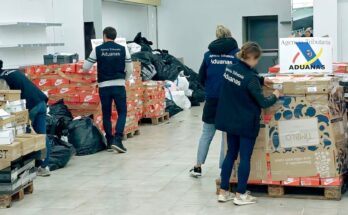Of Ottoman origin and emigrated to Germany in the 1960s together with Turkish “guest workers” who began selling it in the form of a sandwich, the döner kebab has conquered a non-negligible part of the European appetite in recent decades. This meat placed in a pan and roasted vertically has its particular home in Spain, in Toledo, where Ozturk Quebap, a company that has been supplying the product for Mercadona’s Hacendado brand since 2021, has been preparing it for 10 years.
Özcan Öztürk already had a long history in the sector when he arrived in Spain in 2015 from Germany and rented, together with his uncle and partner, from whom he bought his share a year later, a factory in the municipality of Casarrubios del Monte, in La Mancha. They began producing the iconic skewers for the hospitality sector and in 2018 they decided to increase the production of pre-cut meat. «I decided to automate and make that line more professional to enter supermarkets a bit, to differentiate our path from others», says the founder and director in a video call.
When the company started, kebabs didn’t have a glossy reputation and were usually associated with low quality. “The idea of slicing was also based a bit on this. It was clear that the pincho had already reached a point of certain maturity, not only in Spain,” says Hasso Schmidt, manager of the company’s commercial area. “And the already cut and frozen product could be sold to the general public, in supermarkets.” At the turn of the new millennium, Hasso headed the Doner Kebab chain in Istanbul and witnessed the subsequent explosion of Döner Kebab restaurants and the public’s reaction to it. “People were becoming very wary of the product. Partly due to ignorance. They found it very suspicious that there was a piece of meat lying around all day in a store,” he says. In recent years, they both agree, proposals focused on greater quality and greater supply have contributed to changing perceptions. “However, I think the kebab still has a long way to go, because this bad image is not eliminated overnight,” reflects Hasso.
The paths of the Ozturk supermarket chain Quebap and Juan Roig crossed in 2019, before the pandemic, and in 2021 they started working together. “With Mercadona everything changes,” says the director. With the increase in demand, the company purchased a second plant, also in Toledo, in the municipality of Lominchar, which belonged to the Sada poultry wholesale distribution group and which currently concentrates the production of pre-cut meat. Mercadona is responsible for half of its sales. The collaboration with the supermarket, the managers say, was not only noticeable in the accounts: “We have significantly improved our line to reach the highest possible level thanks to Mercadona,” says Öztürk about the quality and safety controls which include, among others, photosensitive technology and artificial vision.
When they had been suppliers for about a year, the product disappeared from the freezers of some supermarkets. At that time Roberto Vidal, known on social media as El Coach Nutricional, published a video in which he explained that the quality of the product had decreased and that, for example, it contained more pieces of skin and fat. As a result, he said in a later publication, Mercadona had withdrawn the product to improve it. Öztürk and Schmidt deny that this was the reason: “When we grew a lot, we couldn’t cover their needs and they waited a year for us to finish the work (to expand their factory) and produce more”, defends the director. The supplies, they say, were not sufficient to supply all the outlets and were limited to those available. This way they may be in some stores and not in others. Regarding the discrepancies between the nutritional values and those printed on the bags that are shown in another video, the managers underline that, in addition to having carried out numerous analyses, these are an average and that they can vary depending on the package and the sample that is extracted.
The king of the catalogue
Chicken kebab is the king of its catalogue, with 80% of sales, to which are added other varieties such as lamb, beef or vegan. Furthermore, they continue to produce spikes. Spain is the main market for cold cuts, but “sales abroad are increasing,” says Schmidt. During this period they have controlled exports to ensure supply to their main customers, but are already working to expand their production capacity. “We don’t want to sell to other competitors of Mercadona. That’s why we want to sell more abroad,” says the director. Among the countries to which his references reach are the United Kingdom, Switzerland, Finland, Greece and Hong Kong. They also want to find a place in German supermarkets. “It’s interesting when people see a manufacturer in Spain. Many are in Poland and Germany, and when they see that we are in Spain they are a little surprised,” says Öztürk.
Last year the company had a turnover of 63.8 million euros and this year it expects to exceed 75 million, with a first half in which it recorded revenues of 37.8 million, almost 24% more than the same period of the previous year. Around 260 people work in the two factories in Toledo, which together cover more than 20,000 square metres.
While it may currently be more tied to home consumption, the company believes its core product, pre-cut meat, has a much longer history. “In the same way that you can’t eat a kebab without a skewer at home, you can’t eat a kebab without a skewer in any restaurant that wants to offer a kebab,” says Schmidt. “It not only serves the family at home, but also the entire professional catering line,” he says. For example, they have already developed a specific reference for pizzerias. “And we have great potential here,” he comments. This does not mean that they have reached the maximum limit on the shelves: “We are now in the frozen sector, but we also want to produce chilled products,” says Öztürk. “Also working with other companies for ready-to-eat (products).”



